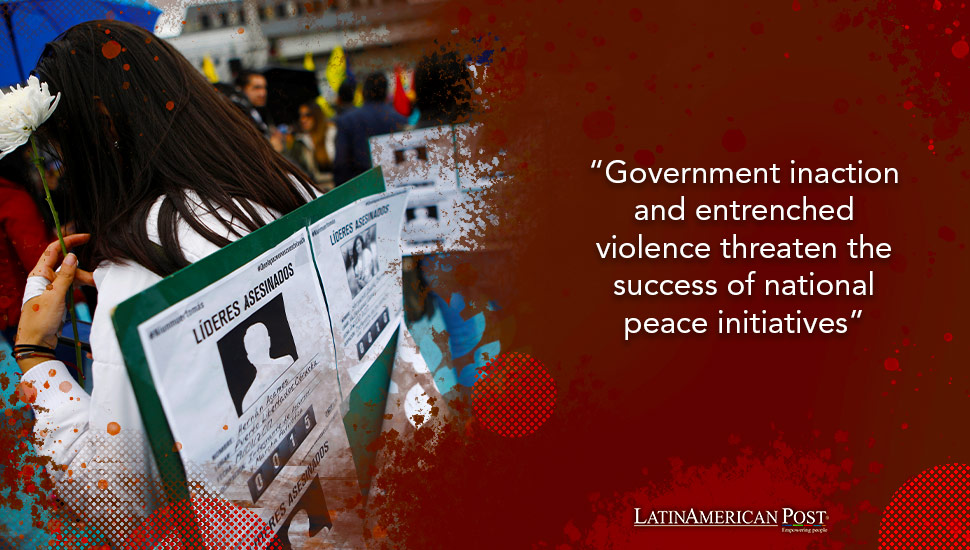57 Deaths Too Many: Colombia’s Peace Plans Threatened by Government Inaction

In Colombia, the recent murders of community leaders underscore a grim reality: government inaction and entrenched violence threaten the success of national peace initiatives, complicating an already tumultuous path toward stability.
The cold pre-dawn hours in Segovia, a municipality nestled in the northwest of Colombia, bore witness to a chilling scene this past Sunday. The community leader Robinson Franco was mercilessly gunned down, marking the third assassination of a human rights defender in the country within just four days. This tragic pattern not only highlights the pervasive violence that community leaders face but also underscores the Colombian government’s alarming incapacity or unwillingness to protect its citizens. This deficiency severely undermines the nation’s peace plans.
Standing Up for Justice: The Life and Tragic End of Robinson Franco
Robinson Franco was an influential figure in Antioquia’s Junta de Acción Comunal of the Carrizal area. His life was brutally cut short by unidentified gunmen who later abandoned his body, an act of violence that has become all too common in regions plagued by conflict. This murder followed closely on the heels of the killings of Jhon Gil, a councilman from Jamundí in Valle del Cauca, and Yarlinton Robledo Rentería, a youth leader from Quibdó, the capital of Chocó. The pattern of these killings paints a troubling picture of the risks faced by those who dare to stand up for justice and community empowerment in Colombia.
These recent assassinations are part of a more significant, more disturbing trend. According to the Observatory of Violence by Indepaz, 57 social leaders and human rights defenders have been killed in Colombia just this year. Each of these deaths is a stark reminder of the ongoing challenges that the country faces in its quest for peace and the protection of its citizens’ rights.
The Colombian government’s response to these atrocities has been tepid at best. Despite numerous peace accords and public commitments to protect its citizens, the state’s actions remain insufficient. This failure exposes Colombia’s peace process’s fragility and reflects a broader regional struggle. Across Latin America, nations grapple with the legacies of violence and conflict, and the task of protecting human rights defenders is a daunting challenge that many governments meet with ambivalence or overt neglect.
In places like Mexico and Honduras, the story is much the same: activists and community leaders face threats and violence, while government protections are often inadequate. The persistence of such violence indicates a systemic issue that transcends borders—a chronic inability or unwillingness by governments to effectively intervene and safeguard those at the forefront of human rights and social justice campaigns.
Threat to Peace Initiatives
This pattern of violence against social leaders in Colombia poses a severe threat to the nation’s peace initiatives. The peace process, already a complex and fragile endeavor, relies heavily on the active participation and protection of community leaders who play critical roles in advocating for and implementing community-focused initiatives. Their systematic elimination not only sows fear and discourages civic participation but also erodes trust in the government’s ability to secure a peaceful and just society.
Furthermore, the frequent assassinations of community leaders undermine the very foundations of democracy. These leaders often represent the most vulnerable and marginalized populations, advocating for rights and resources crucial for fostering a fair and equitable society. Their loss is not just a personal tragedy for their families and communities but a significant setback for democratic governance and social justice nationwide.
The Colombian government must, therefore, reassess its strategies and strengthen its commitments. It is imperative that it take decisive action to protect its citizens, particularly those who risk their lives for human rights and community development. This involves not only improving security measures but also dismantling the networks of violence that permeate various regions of the country. Additionally, there needs to be a concerted effort to bring those responsible for these crimes to justice, thereby sending a clear message that such acts will not be tolerated.
International Support Needed
The international community must also play a role as Colombia continues to navigate its complex path toward peace. Global awareness and pressure can help hold the Colombian government accountable and ensure that sufficient resources and attention are dedicated to protecting human rights defenders. International support can also provide a buffer against the forces that seek to undermine Colombia’s progress toward peace and stability.
Also read: Colombia’s African Outreach: A Strategic Move Towards Global Cooperation
The recent spate of violence against community leaders in Colombia is not just a national issue but a significant impediment to the country’s peace plans. The government’s inability or unwillingness to act decisively is a failure of its duty to protect its citizens and a fundamental flaw that jeopardizes the peace process. For Colombia to achieve lasting peace, it must first ensure the safety and voices of those who lead and represent the grassroots movements essential to the nation’s recovery and growth. The time for action is now, lest the peace sought becomes an unattainable dream.




